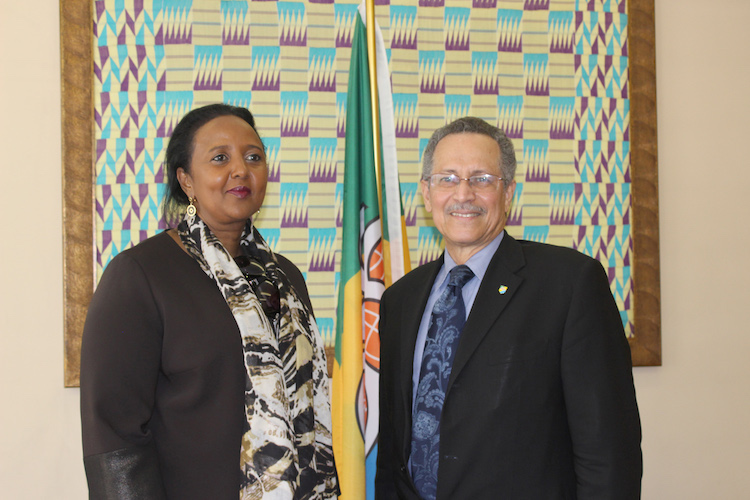Viewpoint by Dr. Patrick I. Gomes
Following are excerpts from a statement ACP Secretary General Dr. Patrick I. Gomes delivered on behalf of the African, Caribbean and Pacific Group of States, at the 14th session of the Conference of the United Nations Conference on Trade and Development (UNCTAD XIV) on July 21, 2016 in Nairobi, Kenya.
BRUSSELS (IDN) – Since its establishment in 1964, UNCTAD has been the appropriate forum to ensure a comprehensive dialogue between developed and developing countries on trade and development and interrelated issues.
The ACP Group expresses satisfaction with the work of UNCTAD and calls for its further strengthening. We recognize UNCTAD’s role as a major institutional stakeholder of financing for development in supporting the follow-up to the 2030 Agenda for Sustainable Development and other recent international agreements.
UNCTAD XIV comes at a watershed moment in international relations following the adoption of the Agenda 2030 on Sustainable Development Goals, the Addis Ababa Action Agenda, the Tenth Ministerial Conference of WTO and the UN Climate Change Conference in Paris in December 2015.
The ACP Group is of the view that these agreements collectively, and combined with the core mandate of UNCTAD, provide the context and set the parameters for UNCTAD’s work for the next four years. We agree with the strong appeal to use trade in implementing the Agenda 2030.
The momentum, from the international agreements has reinforced the critical role of trade and development and interrelated issues of finance, technology and investment for inclusive and sustainable development.
We call therefore for the enhancement of UNCTAD’s capacity to address the 2030 Agenda in support of all developing countries and economies in transition. UNCTAD should further enhance its work on the special problems of the African continent; and as appropriate, accelerate its work on the special needs and problems of Small Island Developing States (SIDS), Landlocked Developing Countries (LLDCs) and other structurally weak, vulnerable and small economies.
The ACP Group urges that those efforts be concerted, coherent and results-oriented. ACP supports actions for integrated global solutions to global challenges dealing with imbalances and inequalities due to uneven gains from globalization.
We reiterate the significance of a fair, open, transparent, rules-based and development-oriented international trading system ensuring market access, and enhancing participation of developing countries, in particular LDCs, in global economic governance.
The ACP Group attaches considerable importance to the functions of the multilateral trade system and the need to ensure effective participation and integration of ACP countries. In this context, we reaffirm our full commitment to conclude the negotiations of the Doha Development Agenda (DDA) and fulfil its mandate in order to address the needs of developing countries and facilitate their effective participation in the international economy.
Moreover, we are concerned at the negative consequences of mega-trade deals outside the WTO being negotiated as this can result in countering intra-ACP trade aimed at addressing preferences erosion.
In the face of stagnating traditional engines of growth, it is imperative that new sources of growth be found.
For instance, ways should be formulated to tap economic growth avenues in South-South cooperation such as through the strengthening of domestic markets of developing countries and the building of sub-regional trading and economic co-operation as Africa’s CFTA.
In this context, programs should be identified that enhance new growth opportunities and value addition as well as generate income opportunities for poor and low-income groups in developing countries. UNCTAD can play a critical role.
The ACP Group shares the view that structural economic transformation through diversification into more modern and technologically-advanced activities and production of higher value products is a key condition for resilience-building and sustainable long-term growth.
Therefore, we recognise that the significance of developing productive capacities is an essential element for such transformation. The ACP Group firmly believes that UNCTAD deserves to be better equipped to deal with its role in the structural transformation of developing economies.
The ACP Group considers South-South and Triangular cooperation as fundamental avenues for enhancing the trade and development of developing countries in this critical time of multiple challenges. The Group considers that these cooperation mechanisms should complement North-South cooperation.
In our quest, as a Group and at the individual country level, to enable specific policies to deal with these challenges, we have received significant international support from UNCTAD.
Their technical cooperation activities have acted as powerful tools for tackling the challenges that the ACP countries and other developing countries face. UNCTAD has played an important role in the implementation of the Istanbul Program of Action; the Vienna Program of Action and the Samoa Pathway. It should be strengthened in order to continue to play this effective role.
We therefore underline the need for UNCTAD to be accorded its rightful place in the outcomes of this Conference.
As we move from decision to action in terms of the recent goals of international fora, data will be critical in order to inform sound policies and specific interventions. We are confident that UNCTAD will be able to deliver on these requirements. [IDN-InDepthNews – 27 July 2016]
Note: This report is part of a joint project of the Secretariat of the ACP Group of States and IDN, a flagship agency of the International Press Syndicate.
Photo: Kenya’s Cabinet Secretary for Foreign Affairs Ambassador Amina Mohamed paid a visit to ACP Secretary General Dr. Patrick Gomes in June 2015.

